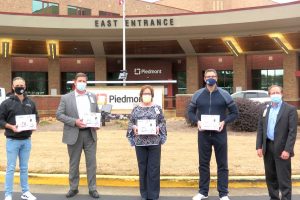While summer vacation usually means giving oneself a vacation, 22 members of the Catholic community in Fayetteville took part of their summer vacations to give to others in Nicaragua June 6 – 13.
The group, 17 associated with St. Gabriel Catholic Church and five associated with Our Lady of Mercy Catholic High School, took part in a missionary trip with Amigos for Christ, a Christian missionary organization, whose goal is to “serve the Lord by serving his poor,” said Kelly Fitzgerald, a full-time Amigos missionary.
Amigos serves the poor in six different areas — health care, education and nutrition, water and sanitation, community development, small business opportunities, and program support for missionaries — Fitzgerald said. To meet these needs, volunteers are necessary.
“Volunteer groups are the backbone of our organization,” Fitzgerald said. “Without them we wouldn’t be able to do anything.”
During the trip, the group accomplished several things. They participated in building foundations and digging water trenches in Villa Catalina (Katherine’s Village), digging water trenches in the village of El Chonco and visiting handicapped children and adults at Hogar Los Ninos (The Children’s Orphanage) in downtown Chinandega.
The group also saw extreme poverty outside Chinandega in the El Limonal dump, a community of refugees displaced by Hurricane Mitch in 1998.
“It was so sad,” said Lin Moore, 16, daughter of Mark and Lisa Moore, a member of Saint Gabriel, and Spalding High School student. “It makes me feel like God made me come here for a reason.”
Amy Metzger, director of music at St. Gabriel, said one reason for her coming is a refresher of the many blessings in her life.
Metzger, who has been making the yearly trip since 2002, said each year the trip renews her sense of service.
“This place feeds me. It shows me our lives have meaning,” she said, adding such a message makes all the sacrifices of modern conveniences worth it.
Such meaning has motivated Metzger to work hard to bring new people down to Nicaragua to lend their service and talents to help the poor. Moore, also on her first mission trip, said the memories she made make her anxious to return next year.
“It was a great thing to experience,” she said. “It was an amazing feeling seeing little kids grab onto you, smiling, thanking you. It just makes me feel so warm inside.”
Even less pleasant things, such as seeing residents of the El Limonal dump bathe in water contaminated with sewage and medical waste, brought memories that will affect the group for a long time, another person said.
“I’ve been humbled,” she said, adding that even despite these conditions, children there would still smile and try to make the most of their situation. “You don’t need a blow dryer or make up. I think it confirms love is all you really need.”
Having people experience that love, especially from God, is something Fitzgerald said she hopes everyone encounters.
“We bring people out of their comfort zone to allow Jesus to speak to them in ways He never had before,” she said. “We want them to leave with the feeling they had a face-to-face with Jesus Christ.”
In doing the work the group did, Metzger said she hopes the Nicaraguans also see the gospel in their actions.
“Saint Francis of Assisi said to ‘preach the gospel at all times and when necessary use words’,” Metzger said. “We spread the gospel by doing, living side by side with Nicaraguans.”
Although she admits it is a slower way to progress, it is better long term, likening the process to teaching a man to fish rather than just giving him one.
Since the method is slow, much of the work done on the trip did not have a visible result, although the group did get to attend the opening and blessing of a water system they helped dig water trenches for.
“Over the week they don’t see the end game,” Metzger said.
Still, Metzger added the work does have a profound impact, even if it won’t be seen until years later. Recalling her first time in Villa Catalina, she said it was a tent city, comprised of 120, 10 feet by 10 feet, one-room tents housing up to 10 people. People slept on the dirt floor or in hammocks and shared one of the 30 latrines there, and had to walk three miles for water. Now she said there are houses, a school and playground for children, running water and many of the villagers are employed.
“It affirms what we have done. We start with one person and reach the world one person at a time,” Metzger said.












Leave a Comment
You must be logged in to post a comment.